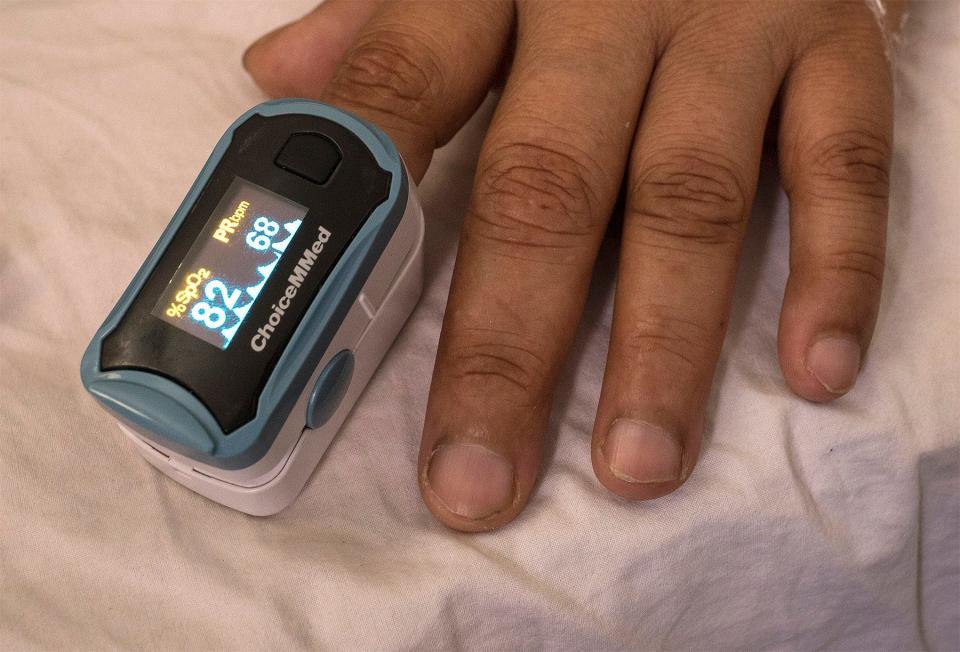Michigan AG presses FDA to toughen stance on racial bias in pulse oximetry
- Oops!Something went wrong.Please try again later.
Michigan Attorney General Dana Nessel joined the attorneys general of 23 other states and the District of Columbia this week in pressing the U.S. Food and Drug Administration to toughen its guidance on pulse oximeter readings for patients with darker skin.
The AGs urged the federal agency to require warning labels on the medical devices, which are used to measure blood-oxygen saturation.
Inaccurate pulse oximeter readings among Black and brown people exacerbate racial health disparities, the attorneys general said, and can lead to delayed treatment, a lower rate of hospital admission and life-threatening consequences.
“A patient’s race should not be an obstacle to accurate and reliable medical diagnosis and treatment,” Nessel said in a statement. “The FDA should require labels to alert users of pulse oximeters that they are not skin-color calibrated. I am proud to join my colleagues in asking the FDA to take immediate action so that further health risk to patients of color can be prevented.”

The flaw in pulse oximeter readings
Pulse oximetry became widely used in the 1980s in the United States, and was initially tested predominantly on white patients.
The problem became especially evident during the coronavirus pandemic, when pulse oximeters, which clip to the end of a finger and can give a fast reading of blood-oxygen levels, were used in hospital emergency departments to assess which patients were most critically ill and needed admission, treatment with supplemental oxygen and steroids. Faulty readings among Black and brown patients may have contributed to higher rates of death in those racial and ethnic groups, especially early in the pandemic.
A University of Michigan study published in the New England Journal of Medicine in December 2020 compared the pulse oximeter readings with the measurements taken by arterial blood gas tests. It found that hypoxemia — a low level of oxygen in the blood — went undetected nearly three times more often on the pulse oximeter readings among Black patients.
"These findings have some major implications, especially during the current coronavirus disease 2019 (COVID-19) pandemic," the authors wrote. "Our results suggest that reliance on pulse oximetry to triage patients and adjust supplemental oxygen levels may place Black patients at increased risk for hypoxemia. ... Our findings highlight an ongoing need to understand and correct racial bias in pulse oximetry and other forms of medical technology."
In the letter, the coalition commends the FDA’s implementation of safety communication about pulse oximeter accuracy and the convening of the Medical Devices Advisory Committee to further address the negative impacts of this device to patients of color. However, the FDA has yet to indicate clear warning labels or provide additional guidance to protect individuals from harm as pulse oximeters are currently sold over-the-counter and used in hospitals and clinics.

Nessel and the attorneys general of Arizona, California, Colorado, Connecticut, Delaware, the District of Columbia, Illinois, Maine, Maryland, Massachusetts, Minnesota, Nevada, New Jersey, New Mexico, New York, North Carolina, Ohio, Oregon, Pennsylvania, Rhode Island, Utah, Vermont, Washington and Wisconsin requested that the FDA take the following steps:
Require manufacturers and vendors of pulse oximeters to include warning labels to all users about effectiveness based on skin tones.
Include similar warnings in other medical devices that incorporate pulse oximeter readings, such as medical device software used for diagnosis or treatment of medical conditions.
Issue guidance to health care providers about the risks and reduced efficacy of pulse oximeters for patients of color.
Implement an expedited timeline for FDA to review the Medical Devices Advisory Committee’s recommendations.
Contact Kristen Shamus: kshamus@freepress.com. Subscribe to the Free Press.
This article originally appeared on Detroit Free Press: Michigan AG asks FDA to be tougher on racial bias in pulse oximetry

